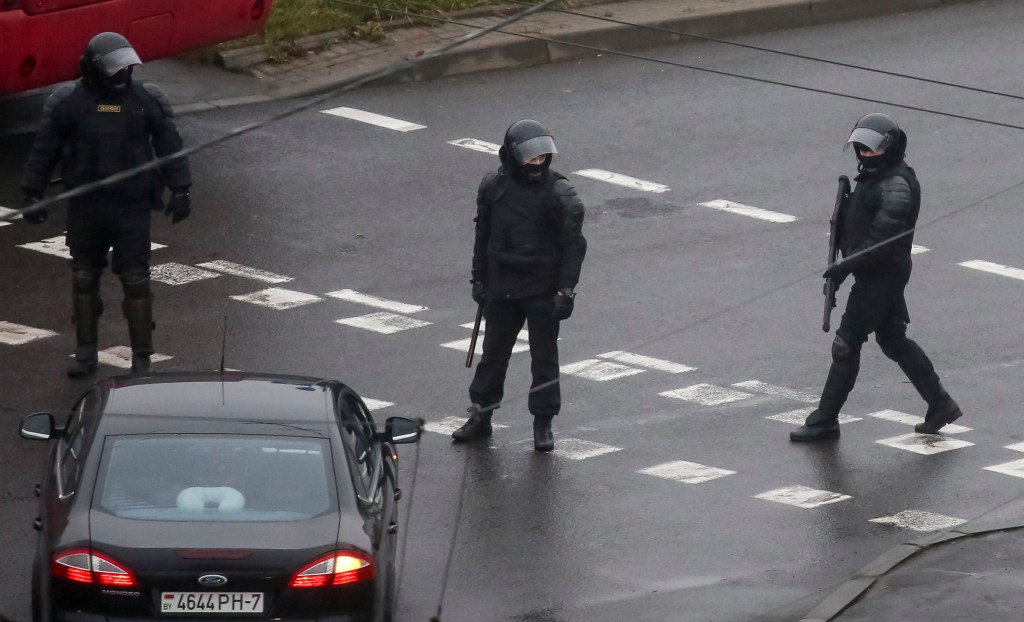Vilnius, Lithuania, June 2, 2021 — Belarusian authorities should release journalist Hlafira Zhuk immediately and cease harassing members of the press over their news coverage, the Committee to Protect Journalists said today.
On May 31, the Maskouski District Court in Minsk, the capital, sentenced Zhuk, a correspondent for the independent news website Narodnaya Volya, to 30 days in detention for allegedly disobeying police while she was covering opposition supporters’ trial on May 14, according to news reports, which said that she is being held in the Akrestsina detention center in Minsk.
“The jail sentence for journalist Hlafira Zhuk is just the latest evidence that it is next to impossible to report freely in Belarus,” said CPJ’s Europe and Central Asia program coordinator, Gulnoza Said, in New York. “Belarusian authorities should cease harassing and detaining journalists, and should let the media report the news without fear.”
Since May 30, authorities have also harassed or detained at least five other journalists, according to news reports and journalists who spoke with CPJ.
On May 30, police officers in the western city of Hrodna briefly detained Aleksey Shota, editor-in-chief of the independent news website Hrodna.life, according to news reports and the journalist, who spoke to CPJ in a phone interview.
Shota said that police officers in plain clothes detained him near his home and confiscated his laptop and three computer drives. Authorities later charged him with “distribution of extremist materials” in relation to content published on Hrodna.life, he said. If convicted, he could face a fine of up to 16,000 Belarusian rubles ($6,300) according to the country’s administrative code.
Shota said the charges stemmed from a May 24 article published on Hrodna.life that featured a summary of foreign press coverage of the detention of blogger Raman Pratasevich, which also included the logo of channel Pratasevich’s Telegram channel NEXTA, which authorities consider to be an “extremist” symbol. He said Hrodna.life took down the image later that day, but police had already seen it.
Shota told CPJ that police considered Hrodna.life special projects editor Irina Novik directly responsible for publishing the article and the logo. Police raided Novik’s home on June 1, arrested her, and charged her with “distribution of extremist materials, containing calls to extremist activity,” according to Shota and news reports. Shota said he believed she would be sentenced in the next few days.
On May 31 the national prosecutor general’s office sent an official letter to Aksana Kolb, the editor-in-chief of independent newspaper Novy Chas, warning her that the outlet had “used certain expressions and certain speech that contributes to the escalation of tension in society, incites hatred and enmity against government officials,” according to a report by Novy Chas and Kolb, who spoke to CPJ by phone.
Kolb told CPJ that “these allegations are ridiculous,” but called the letter “a sign that more severe punishment may follow.”
Also on May 31, a Minsk city court dismissed an appeal for the release of independent news website Tut.by editor-in-chief Maryna Zolatava and business reporter Elena Tolkacheva, according to reports. The two were first arrested on tax evasion charges on May 18, as CPJ documented at the time. If convicted, they could face up to seven years in prison and fines, according to the Belarusian criminal code.
CPJ is also investigating today’s sentencing by the Oktyabrski District Court, in Minsk, of Dzmitry Ruto, a reporter with the news website Tribuna. According to multiple reports by his employer, officers detained Ruto yesterday after finding in his car a white and red scarf, the colors associated with anti-government protests. He was charged and convicted with illegally organizing mass events, and sentenced to 15 days in detention today, according to those reports. CPJ was unable to immediately determine whether the charge was retaliation for his journalism.
Volha Khvoin, head of analysis and information services at the Belarusian Association of Journalists, a local advocacy and trade organization, told CPJ by phone that the recent detentions “indicate that the authorities have chosen a road of repression and journalists are the clear target group.”
CPJ called the Oktyabrski District Court, Maskouski District Court, and Leninski police station for comment, but the calls rang unanswered or the people who answered refused to comment.
CPJ also repeatedly called Volha Chemodanava, the head of the press office of the Belarusian Ministry of Interior, but no one answered.
